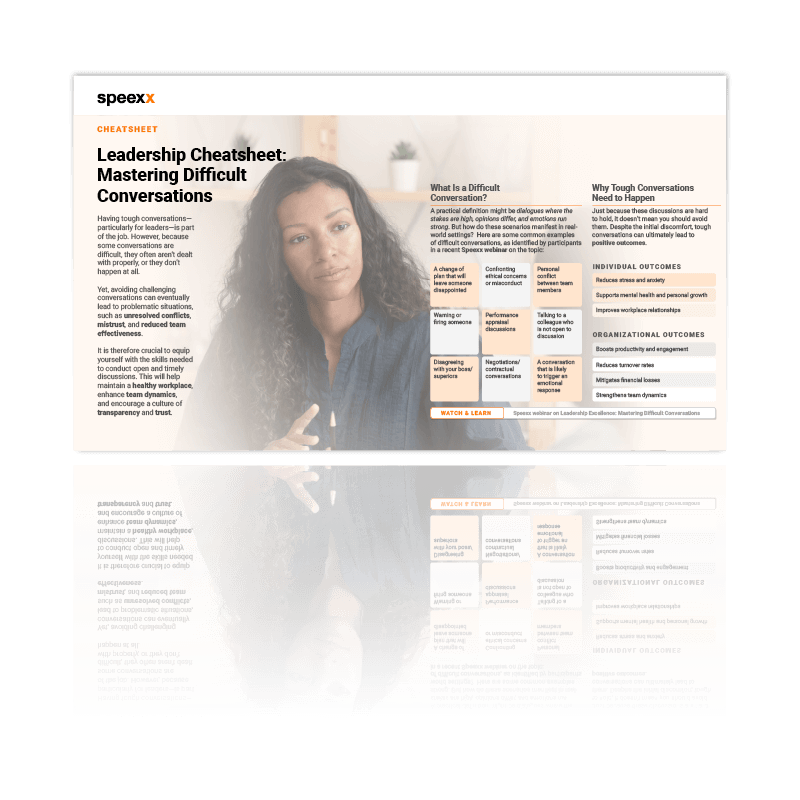Last updated: April 3, 2025
In the era of digital transformation, technology has become an integral part of the workplace. Hybrid offices and the growing workforce of Generation Z are changing the way organizations operate, and leaders must adapt to keep up. The requirements for leaders in a digital workplace have changed, so it’s important for HR and L&D professionals to understand what it takes to succeed in this new era of leadership. In this article, we’ll explore what leadership in the digital age entails, its challenges, and the skills leaders need to thrive.
Leadership Development in the Digital Era
According to the Learning and Performance Institute, leadership development in the digital age is about “equipping leaders with the digital skills and knowledge they need to effectively lead their teams in a digital world.” This means equipping leaders to strategically leverage tools like data analytics and artificial intelligence—not just to improve operations, but to drive innovation and adaptability. As Forbes notes, successful digital-age leaders adopt a data-driven mindset, build AI-ready teams, and integrate AI to gain strategic advantages. It also means teaching them how to lead remote teams, work collaboratively, and communicate effectively in a digital environment.
As organizations continue to embrace digital transformation, the role of the leader is changing. In the past, leadership was about giving orders and making decisions. However, in the digital age, leaders must be more collaborative and inclusive. They must create a culture of innovation and encourage their teams to experiment and take risks. They must also be flexible, able to adapt and change course quickly as new technologies or market conditions advance.
Harvard Business Review’s “Leading in the Digital Age” report says leaders must develop their digital competencies, foster a culture of continuous learning and embrace data-driven decision making. The report highlights the importance of agility, collaboration, and customer-centric strategies to manage the complexities of the digital environment. A data-first culture is increasingly seen as non-negotiable. Building on this, the Forbes Business Council points out that leaders who prioritize data skills are more equipped to make objective, informed decisions in high-pressure environments.
Steve Denning, a Forbes contributor, suggests that the new style of leadership in the digital age is about creating a sense of purpose and meaning for employees. “Leaders must be storytellers, inspiring their teams with an engaging vision and narrative that aligns with the organization’s goals and values.” Notably, this is especially important for Generation Z, which values meaningful work and purpose-driven careers.

Gen Z represent 30% of the workforce. Discover how to engage and inspire them in this infographic.
Strategic Priorities for Digital Leaders in 2025
The World Economic Forum outlines five strategic priorities for digital leaders this year, including aligning tech initiatives with overall business goals, adopting responsible AI, investing in digital skills, and cultivating agile cultures. In addition, leaders are also urged to think beyond tools and focus on long-term human capital strategies to future-proof their organizations.
Empathetic Leadership Fosters Innovation
The ability to innovate is vital for any organization looking to succeed in the post-pandemic world. In today’s rapidly changing business environment, companies must adapt quickly to new challenges and opportunities. Empathetic leadership can help foster a culture of innovation and creativity in the workplace.
Catalyst, a global non-profit, found that empathetic leaders drive higher innovation rates than those without empathetic leadership. This suggests a strong link between empathy and creative, problem-solving teams. Empathetic leaders create safe, supportive environments that encourage employees to take risks, share ideas, and explore new approaches.
When employees feel valued and heard, they’re more likely to contribute to developing new products, services, and solutions. Empathetic leaders also value diversity and inclusion. They build teams with varied perspectives, experiences, and backgrounds to fuel innovation.
They understand each team member’s strengths and promote open communication. Inclusive, diverse teams bring broader thinking and lead to more creative solutions. By prioritizing collaboration and teamwork, empathetic leaders create a culture where ideas can flourish.
Leadership Challenges in the Digital Era
Leadership in the digital age comes with its own set of challenges. For example, according to the Forbes article Challenges of Leading in a Digital Age leaders face several key challenges:
- Keeping up with emerging technologies: Leaders must continually learn to keep pace with technological advances. They must be open to new ideas and willing to experiment with new approaches. They must also be comfortable with ambiguity and uncertainty, as digital transformation can be unpredictable and complex.
- Balancing technology integration and data privacy: Implementing new tools while protecting against cyber threats requires a careful strategy.
- Managing remote and diverse teams: With more people working from home or remote locations, leaders need to find new ways to keep their teams engaged and productive. This requires new communication strategies and tools, such as video conferencing, project management software, and collaboration platforms.
- Foster a culture of continuous learning: Encouraging constant development is essential to remain competitive in the digital environment.
- Overcoming resistance to change: Overcoming internal opposition is key to the success of digital transformation initiatives.
Taken together, these challenges highlight the multifaceted role that leaders must adopt to lead teams in the midst of a digital evolution.
The Digital Maturity Report 2024 reveals a widening gap between companies with strong digital leadership and those falling behind, underlining the importance of sustained investment in upskilling and strategy.

Difficult conversations are inevitable. Use this cheatsheet for fast, effective ways to handle them positively.
Evolving Leadership Development Priorities
As the workplace continues to evolve, so too do the expectations placed on leaders. According to the 2024 Leadership Development Benchmark Report, organizations are placing renewed focus on adaptability, digital confidence, and emotional resilience in their training programs. This shift reflects the growing complexity of leading hybrid teams and responding to fast-changing tech environments.
Leadership Skills for the Digital Age
Faced with the challenges presented by the digital transformation of the world of work, there are skills that organizations should develop, such as knowing how to use communication platforms and learning to self-manage. For leaders, there are a number of key competencies they need to develop:
- Creativity: they must be creative and innovative, capable of coming up with new ideas and solutions to complex problems.
- Communication: they must be effective communicators, able to articulate their vision and strategy clearly to their team members.
- Collaboration: they must be collaborative, able to work with others to achieve common goals.
- Critical thinking: they must be critical thinkers, able to analyze data and make informed decisions.
- Emotional intelligence: they need to have emotional intelligence, to be able to understand and respond to the needs and feelings of their team members.
- Agility: they need to be agile and adaptable, able to respond quickly to changes in the market or to new technologies.
- Digital literacy: they must be digitally literate, able to use new technologies and tools effectively

Leadership in the Digital Era: Much More Than Technology
While new technologies are transforming the workplace, leadership is about people and the relationships leaders build with their teams. As organizations continue to embrace digital transformation, leaders must adapt to new requirements and challenges. They need to be creative, collaborative, critical thinkers and emotionally intelligent, and they need to have the skills and knowledge to manage remote teams and use new technologies effectively.
Ultimately, the future of work is digital, and leaders who are prepared to embrace this change and lead their teams effectively will be the ones who succeed. The digital age offers leaders the opportunity to create more meaningful, goal-oriented work for their employees, as well as drive innovation and growth in their organizations. By investing in leadership development in the digital age, organizations can position themselves for success in the years ahead.

